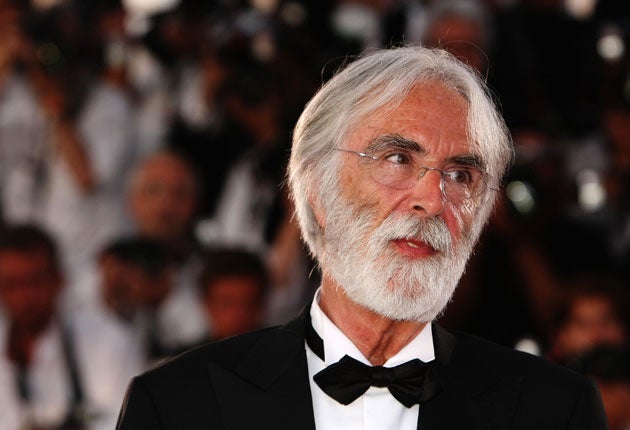Haneke, maestro of misery, wins Cannes Palme D'Or
Judges' unexpected choice matches mood at most restrained festival for years

Your support helps us to tell the story
From reproductive rights to climate change to Big Tech, The Independent is on the ground when the story is developing. Whether it's investigating the financials of Elon Musk's pro-Trump PAC or producing our latest documentary, 'The A Word', which shines a light on the American women fighting for reproductive rights, we know how important it is to parse out the facts from the messaging.
At such a critical moment in US history, we need reporters on the ground. Your donation allows us to keep sending journalists to speak to both sides of the story.
The Independent is trusted by Americans across the entire political spectrum. And unlike many other quality news outlets, we choose not to lock Americans out of our reporting and analysis with paywalls. We believe quality journalism should be available to everyone, paid for by those who can afford it.
Your support makes all the difference.It was an austere end last night to an uncharacteristically no-frills Cannes Film Festival.
The Austrian director, Michael Haneke, master of the disturbing, bleak and downright depressing, took home the festival's Palme D'Or for his black-and-white film about a children's choir in a northern German village, set on the eve of the First World War.
His presence at Cannes had a peculiar circularity to it; the last time he was in town, he took home the Grand Prix, an award second only to the Palme d'Or, for his film about a sado-machostic female musician, The Piano Teacher, which starred Isabelle Huppert.
Haneke was handed the Palme d'Or by Huppert herself, who this year presided over the jury, which also included the British writer Hanif Kureishi. There had been a long line of former Palme d'Or winners contending for a repeat victory last night, among them Quentin Tarantino with his gore-fest Inglourious Basterds, Jane Campion with her love story about John Keats, Bright Star, and Pedro Almodovar, with his trademark casting of Penelope Cruz, Broken Embraces.
Two French directors had been tipped to win: Jacques Audiard with his prison drama A Prophet and countryman Xavier Giannoli's ex-con tale In the Beginning. Campion's historical romance had also been a frontrunner.
Two British directors had been in contention for the prize this year, Ken Loach and Andrea Arnold. There had also been a line of lighter, upbeat films, produced by directors such as Ang Lee and Loach, who are better known for their serious dramas. But the panel of judges evidently made clear they were in no mood for a film that could, even vaguely, be described as uplifting, either for the Palme d'Or, or the night's other prizes. The Grand Prix was awarded to Audiard and A Prophet.
Christoph Waltz received the Best Actor prize – the sole award given to an American film – for his villainous role in Tarantino's film about Jewish-American soldiers who brutally revenge-kill key members of the Third Reich.
Charlotte Gainsbourg took the actress prize for her performance as a grieving mother in Lars von Trier's Antichrist, the director's first attempt at producing a horror film, which was partly met by booing at its premiere.
The veteran French director, Alain Resnais, in competition with Wild Grass, received a lifetime achievement award from the jury and a standing ovation from the audience in the Grand Théâtre Lumière.
Haneke has never before won top honours at Cannes but many film critics would vociferously argue that he should have, a long time ago. At 72, he was among the oldest nominees of the 20 filmmakers vying for the Palme d'Or, and is one of the festival's most revered veterans. He has directed Funny Games, Code Unknown and Hidden, the latter two starring Juliette Binoche. Haneke's greatest commercical success came with The Piano Teacher in 2001, but he has received critical success for almost everything he has made.

Watch Apple TV+ free for 7 days
New subscribers only. £8.99/mo. after free trial. Plan auto-renews until cancelled

Watch Apple TV+ free for 7 days
New subscribers only. £8.99/mo. after free trial. Plan auto-renews until cancelled
The austere nature of the winning film was in keeping with an uncharacteristically quiet festival, which has somewhat become as synonymous for its parties as its film premieres – until the recession hit, that is. This year, there was only a fraction of the profligate champagne swilling that goes on most years, and many parties, including Vanity Fair's legendary shindig, were cancelled.
There may not have been a much of the glitz but there was an A-lister contending with food poisoning (Cruz on the eve of Almodovar's premiere), diva-esque moments from arthouse directors (Von Trier telling people he was the "world's greatest director" at the premier of Antichrist), and Maria Carey's astonishing performance as the barely recognisable social worker in the drama Precious, for which Carey scrubbed her face clean of make up.
Join our commenting forum
Join thought-provoking conversations, follow other Independent readers and see their replies
Comments